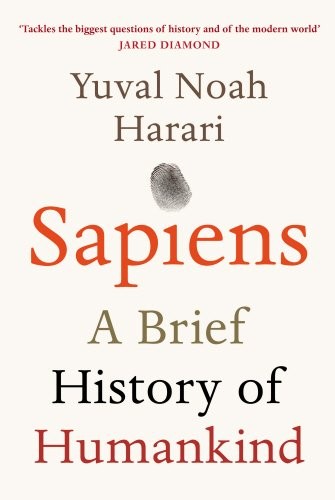Fascinating and provocative book
4 stars
A book that examines how humans evolved and what lies ahead for them. The book offers intriguing insights on historical events, but some of them are controversial and debatable.

eBook, 466 pages
English language
Published Sept. 4, 2014 by Vintage.
100,000 years ago, at least six human species inhabited the earth. Today there is just one. Us. Homo sapiens.
How did our species succeed in the battle for dominance? Why did our foraging ancestors come together to create cities and kingdoms? How did we come to believe in gods, nations and human rights; to trust money, books and laws; and to be enslaved by bureaucracy, timetables and consumerism? And what will our world be like in the millennia to come?
In Sapiens, Dr Yuval Noah Harari spans the whole of human history, from the very first humans to walk the earth to the radical – and sometimes devastating – breakthroughs of the Cognitive, Agricultural and Scientific Revolutions. Drawing on insights from biology, anthropology, paleontology and economics, he explores how the currents of history have shaped our human societies, the animals and plants around us, and even our personalities. …
100,000 years ago, at least six human species inhabited the earth. Today there is just one. Us. Homo sapiens.
How did our species succeed in the battle for dominance? Why did our foraging ancestors come together to create cities and kingdoms? How did we come to believe in gods, nations and human rights; to trust money, books and laws; and to be enslaved by bureaucracy, timetables and consumerism? And what will our world be like in the millennia to come?
In Sapiens, Dr Yuval Noah Harari spans the whole of human history, from the very first humans to walk the earth to the radical – and sometimes devastating – breakthroughs of the Cognitive, Agricultural and Scientific Revolutions. Drawing on insights from biology, anthropology, paleontology and economics, he explores how the currents of history have shaped our human societies, the animals and plants around us, and even our personalities. Have we become happier as history has unfolded? Can we ever free our behaviour from the heritage of our ancestors? And what, if anything, can we do to influence the course of the centuries to come?
Bold, wide-ranging and provocative, Sapiens challenges everything we thought we knew about being human: our thoughts, our actions, our power ... and our future.
A book that examines how humans evolved and what lies ahead for them. The book offers intriguing insights on historical events, but some of them are controversial and debatable.
It's very convincing and I really appreciate the ideas and perspective on religion especially. I learned long after reading it about the complete disregard for evidence and accuracy.
It's very convincing and I really appreciate the ideas and perspective on religion especially. I learned long after reading it about the complete disregard for evidence and accuracy.
Excellent work. Sapiens is fairly short, considering how much it covers – the whole human history, pretty much – but manages to be both entertaining and educational.
Apparently also shocking – looking at some reviews, Harari's views on the benefits of agriculture (it being the biggest fraud in human history) have struck a nerve with some folks. But I agree with Harari here: while from the viewpoint of a privileged urban European, agriculture is a sweet deal, I'm sure it hasn't been such a great deal for most people involved in it in human history.
All in all, Harari seems to hit the key points in Homo Sapiens history quite well. This is highly recommended to anybody, especially if you haven't studied human history much. If you've well read, there's little new here, but it's still a well-written and an entertaining book.
Excellent work. Sapiens is fairly short, considering how much it covers – the whole human history, pretty much – but manages to be both entertaining and educational.
Apparently also shocking – looking at some reviews, Harari's views on the benefits of agriculture (it being the biggest fraud in human history) have struck a nerve with some folks. But I agree with Harari here: while from the viewpoint of a privileged urban European, agriculture is a sweet deal, I'm sure it hasn't been such a great deal for most people involved in it in human history.
All in all, Harari seems to hit the key points in Homo Sapiens history quite well. This is highly recommended to anybody, especially if you haven't studied human history much. If you've well read, there's little new here, but it's still a well-written and an entertaining book.